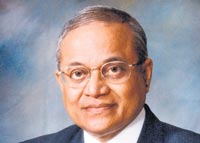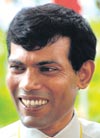| Britain,
not India changing Maldivian landscape
By Feizal Samath in the Maldives
Male – The Maldive Islands like
many countries in South Asia has engaged with India
in a ‘friendly’ way and the powerful neighbour’s
dictatorial and ‘big brother’ attitude or
just straight involvement is similar to what happens
in the region.
There is one exception however: it
is Britain and not India that is helping to sort out
problems between President Maumoon Abdul Gayoom and
the opposition. It is Britain that the two sides have
turned to, to mediate in the process of transforming
from an executive presidency to a multi-party system.
 |
| President Maumoon Abdul Gayoom
|
Overall it’s Britain, China
and India that are playing key roles in the developments
that are gearing the country towards multi-party polls,
an end to presidential rule and youth freedom.
The talk here is that Gayoom may opt
for Singapore as his next home if his regime ends –
to this equation and that makes it four external countries
involved in the country’s stakes.
Don’t forget Sri Lanka. It’s
from Colombo that the Maldivian Democratic Party (MDP)
is driving its worldwide campaign for political reforms
in the Maldives. Britain is also facilitating talks
to be held in Colombo between the Maldivian government
and the MDP, Gayoom’s nemesis and arch political
opponent.
As the country heads towards a new,
much-looked forward to era of freedom and an end to
political repression, foreign analysts say foreign engagement
in the Maldives is bringing new dimensions to regional
politics.
Why is Britain involved rather than
India? That’s because although the Maldives is
part of South Asia, it is rather isolated from the rest
of the region, according to Ibrahim Hussain Zaki, former
minister and MDP Vice-President of the MDP.
“There are no common borders
to share with India and neither is the economy dependent
on India unlike other countries. Trade and the economy
is more connected to Commonwealth countries, the EU,
and the US, which is why they are more involved than
any other South Asian country,” he said.
 |
| Mohamed Nasheed |
On China's role in the Maldives, Mr.
Zaki said China is interested in the Maldives because
of its strategic position in the Indian Ocean. There
is growing suspicion, as reported in some international
newspapers, that the Chinese are interested in establishing
a submarine base in the Maldives, which would act as
a counterweight to Indian power in the region.
“China is attempting to build
friendlier relations with the Maldives by giving it
foreign aid, particularly in housing, infrastructure
and arms,” he said.
Other analysts believe that Gayoom
realises that Indian support will not be guaranteed
at all costs particularly if stability is threatened
by suppressing democracy groups and thus - as a fall
back option – is leaning towards China, a country
with similar governance principles and disregard for
democratic reform and human rights.
But analysts also say Indian’s
intelligence agency RAW (Research & Analysis Wing)
is acting as a go-between, between Gayoom and MDP emissaries.
“Both sides have a line to RAW
which is acting as a mediator in an unofficial way,”
one analyst noted.
Analysts also believe India is concerned
about Gayoom’s safe exit if and when he loses
power and is engaging the Maldivian opposition to ensure
a smooth transition of power when it happens. Last week
a delegation of MDP parliamentarians spent several days
in India at state invitation.
Returning to the Maldives on a fact-finding
mission, after a period of nearly eight years, I found
the situation changing fast with residents, particularly
the younger population standing up to the government,
prepared to take to the streets and openly challenging
the administration. Ten years ago, that would have courted
arrests and disaster. No one dared then.
For example on a visit about 10 years
ago, included in my programme was an interview with
a popular political activist who was under house arrest.
He wasn’t allowed visitors and had to follow a
strict regime inside. I walked into a neighbour’s
house and – under a pre-arranged plan –
shouted out the questions over the wall separating the
two houses as if I was carrying out a conversation with
someone in the house I was in. The responses from the
detainee came in the same format. Ten days ago, I walked
into the home of MDP chairperson and founder Mohamed
Nasheed, who is similarly under house arrest, without
any fuss. There were no secret service agents lurking
around – or even if they were they were making
a damn good job of watching the place and who went in
without being spotted. The MDP chief, popularly known
as Anni, and I, freely discussed the political situation
and the future of the country.
Here are excerpts of the interview:
The mood:
Gayoom has to go. That’s a definite
need. All these people have joined the party for that
reason. If we go for a membership drive (we now have
35,000) we are confident well over 50 percent of the
electorate will join us.
If there are free and fair elections,
Gayoom will fail badly. I don’t think he’ll
get 10-15 percent of the vote. The only people around
him are his cronies less than 5,000 who have a lot to
lose if the regime changes.
On open criticism of the
President
People are getting rid of their fears
rapidly not because Gayoom has mended his ways. He still
keeps arresting people but residents have decided that
enough is enough.
On a witchhunt against Gayoom
and his aides when his regime collapses
Any witch hunt would complicate things
in the country. It’s a difficult task. But we
have to stop any retribution. We are looking at some
international models like the South African Truth Commission
because politicians and cronies have to pay for their
crimes in some form. We know who suffered and we can
try to defuse it with people who suffered.On demography
changes, an assertive younger population, the need for
more jobs for educated.
Maldivian and the fate of
some 40,000 foreign workers
There are more, younger people who
are educated but don’t have jobs. We are looking
at more growth and more jobs. Foreigners will continue
to play a key role in the economy because many are connected
to the resorts.
On political reforms and
whether international scrutiny or public demands that
led to the changes
It was public agitation. There is
really no international scrutiny and we are frustrated
by this. Here is a 100 percent Islamic society with
an emerging democratic party. When the world gets involved
it would be too late.
If polls don’t take place in
mid-2007 for polls date, what would happen?
People are already impatient. There
are a lot of youth groups in the last two months who
want Gayoom to step down now or overthrow him.
Is the president delaying
reforms because he doesn’t have an escape route?
Gayoom cannot reform. Look, if he
reforms the judiciary and the public is allowed to file
action, overnight there will be many, many cases against
him. That’s impossible for him to face.
Is there a drug problem
in the Maldives?
About 30 percent of the youth are
into drugs. It also has regional implications. It’s
good money and since there are many rich people in Male
it is easier to sell more drugs here than in Colombo.
Recently the authorities picked up
1.5 tonnes of marijuana from a lagoon in the next atoll.
No one knows how it came there. That’s a huge
amount and it looks like the Maldives is being used
as a transit point.
| Raw
has no role |
| Excerpts
of responses given by Maldivian Chief Government
Spokesman Mohamed Hussain Shareef to questions
posed by The Sunday Times .
On MDP popularity
One year since the introduction of political
parties in the Maldives, the MDP has just over
10,000 registered members, whereas the Dhivehi
Rayyithunge Party (DRP) - led by President Gayoom
- has over three times that number.
President Gayoom enjoys overwhelming support
across the country. Alarmingly, the majority of
MDP members are failed businessmen, ex-convicts,
young drug offenders, people with personal vendettas
against senior government officials and people
with criminal records. It would be safe to say
that, should an election be held anytime soon,
the DRP would record a landslide victory.
The democratic reform agenda that the President
initiated on 9 June 2004, includes constitutional,
legislative and institutional reforms, aimed at
ushering in a modern liberal democracy in the
Maldives.
Polls
It is not viable to hold an election in 2007,
as voter and civic education is a must before
holding an election. Also, the Westminster House
Agreement does NOT include the issue of holding
elections earlier than announced in the Roadmap.
Political prisoners
There are no political prisoners in the Maldives.
(The MDP says there were 300 before the WHA but
many have been released.)
Governance system
The people are going to decide on what system
of governance the country should have in the new
Constitution. It is the MDP and the MDP's youth
groups that are demanding this. The system of
governance is not for the MDP to decide. It is
for the people to decide. The MDP is a minority
and doesn’t speak for the Maldivian people.
I believe you have been grossly misinformed about
the realities of Maldivian politics. As an independent
journalist, I believe you need to conduct a visit
to the Maldives (without MDP funding or influence)
and see the country and the reforms firsthand
and through your own eyes.
On RAW involvement
No! RAW has no role in this process |
| 